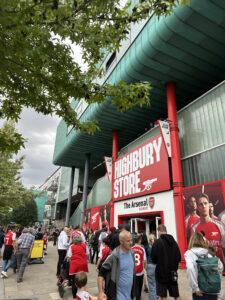
BY MUHSIN MAHMUD
As the UK grapples with its most severe civil unrest in recent memory, the resilience of football fans shines through the darkness. The riots that erupted in late July 2024, sparked by a tragic incident in Southport and fueled by far-right misinformation, have cast a long shadow over daily life. Yet, on match days, stadiums like the Emirates continue to fill with supporters, their love for the game undiminished.
We spoke with several Arsenal fans to understand how the current climate has affected their match-day experiences and what drives them to keep attending games despite the risks.
Emmanuel Adeyemi-Abere, a regular at the Emirates, arrived for the match against Crystal Palace with a mix of excitement and caution. “It’s definitely been on the mind of my family,” he explained, describing the pre-match conversations at home. “My mum, my dad, and both my brothers were like, ‘Make sure you get yourself to the stadium safely, make sure you get yourself back safely.'”
This heightened awareness is a common theme among fans, particularly those from minority backgrounds. The riots, which have seen far-right groups targeting immigrant communities and spreading Islamophobic rhetoric, have created an atmosphere of tension that extends beyond the affected areas.
For Nora, a first-time attendee at the Emirates who also wears the hijab, the decision to come to the match was not made lightly. “I felt alright,” she said, “But at the same time, I’m careful of my surroundings.” Her cautious optimism reflects the broader sentiment among many fans – a determination to enjoy the beautiful game while remaining vigilant.
The impact of the unrest is perhaps most acutely felt by those living in areas directly affected by the riots. Reon Brookes, hailing from South London, shared his mother’s apprehensions about his attendance. “Obviously before I came, my mom was apprehensive about me attending the game because of the current riots taking place, especially in South London where I’m from.”
Despite these concerns, Brookes’ commitment to his team remained unwavering. “My team’s playing, and I wouldn’t miss it for the world,” he stated emphatically. His sentiment echoes the broader narrative emerging from this crisis – one of resilience and unity in the face of division.


 Indeed, the diversity seen in the stands at the Emirates serves as a powerful counterpoint to the divisive rhetoric fueling the unrest. Emmanuel reflected on this, saying, “One of the beautiful things about sport is that it’s a gateway into having conversations about what’s going on in wider society. If you look at football, you see different backgrounds, religions, races. It’s a beautiful thing.”
Indeed, the diversity seen in the stands at the Emirates serves as a powerful counterpoint to the divisive rhetoric fueling the unrest. Emmanuel reflected on this, saying, “One of the beautiful things about sport is that it’s a gateway into having conversations about what’s going on in wider society. If you look at football, you see different backgrounds, religions, races. It’s a beautiful thing.”
This diversity, however, also underscores the challenges faced by minority communities in the current climate. Reon spoke candidly about the ongoing struggle against adversity: “We always have to battle, you know, in society. But at the end of the day, I’ve worked hard to get where I am in life, and nothing can stop me.”
As the match unfolded, the tensions of the outside world seemed to dissipate, replaced by the familiar rhythms of the game. Chants echoed around the stadium, creating a sense of unity that transcended the divisions plaguing the nation.
Emmanuel summed up the prevailing mood: “We need to focus more on the things that bring us together rather than those that push us apart.” In the context of football, this unity is palpable. The challenge now is to extend this spirit beyond the confines of the stadium.
 As fans streamed out of the Emirates after the final whistle, there was a sense that they had participated in something more significant than just a football match. In these troubled times, their presence was a testament to the enduring power of sport to bring people together.
As fans streamed out of the Emirates after the final whistle, there was a sense that they had participated in something more significant than just a football match. In these troubled times, their presence was a testament to the enduring power of sport to bring people together.
The riots may continue to dominate headlines, but in stadiums across the UK, a different story is unfolding. It’s one of resilience, unity, and the unwavering spirit of football fans. As the country searches for a way forward, the beautiful game offers a glimpse of what’s possible when people come together, regardless of their differences.